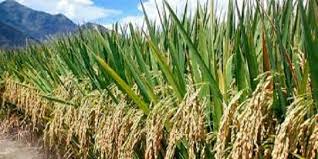Pak-China universities to establish research center on hybrid rice

China Economic Net
Beijing: China’s Wuhan University and University of the Punjab Joint Research Center for Honglian Hybrid Rice will be established this year, revealed by the official website of China Association for Science and Technology.
This move will boost the development of high-yield hybrid rice in Pakistan, a major rice exporter in the world, to improve domestic food safety as well as supplement rice export, according to a report published by China Economic Net (CEN) on Friday.

Honglian hybrid rice is one of the three major types of cytoplasmic male sterility (CMS) of rice that has been commercially used in hybrid rice seed production.
In China, it is a well-known hybrid rice type developed for over 40 years by Zhu Yingguo, the late member of the Chinese Academy of Engineering and expert in plant genetics and breeding. By 2020, the global acreage of Honglian hybrid rice has surpassed about 26.67 million hectares.
The production of Honglian hybrid rice in Pakistan can reach around 7,500 kg per hectare, nearly three times as much as that of many other rice varieties, according to Zhu Renshan, professor-level senior engineer of Wuhan University who is now in charge of the international cooperation on this type of rice.
“A lot of hybrid rice varieties’ high-yield performance is only confined to a specific area. In contrast, Honglian hybrid rice can create bumper harvest not only in China but also in many other countries like Pakistan,” Zhu Renshan said.
Honglian hybrid rice adapts well to Pakistan’s climate. Even under extreme high temperature or changeable weather, the seed setting rate is still stable, much higher than that of other hybrid rice varieties. Moreover, Honglian rice seed production costs less. Therefore, farmers can get higher income at the same investment.
It’s also worth mentioning that Honglian hybrid rice is eco-friendly because of the higher nitrogen use efficiency characteristic, exhibiting vigor and good yield even in barren soil. In this way fertilization can be decreased.
In 2019, the exchange visits between the two nations’ agricultural experts on Honglian hybrid rice had been done. Shahzad Sabir, Punjab Agriculture Extension Director, and professors from University of the Punjab, praised Honglian hybrid rice’s quality of heat-tolerance and adaptability, which suits Pakistan’s climate. Having seen Honglian hybrid rice does so well in the six experimental plots in Pakistan, the two countries’ professionals are confident in its future performance when sowed at a large scale.
Next, besides lifting local cultivation, the research center is planning a series of technical cooperation and scientific research. Seed production technologies will be gradually transferred to Pakistan. Furthermore, they will also provide technical support on pest control.
Though COVID-19 pandemic is still wreaking havoc in the world, Pak-Sino cooperation related to Honglian hybrid rice keeps progressing.
The two countries’ experts are communicating online and have held a video meeting of technical guidance.
Earlier this year, the research team of Wuhan University delivered seeds from China to Pakistan via international logistics, and the rice will be harvested in October.





